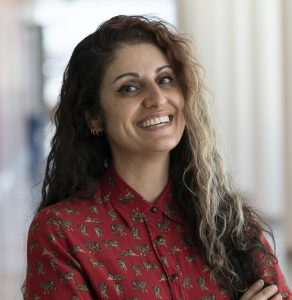Nov
04

Posted by liaison on November 4th, 2021
Posted in: #CC/Academic List, #Health Interest List, #Health Sciences List, #Public/K-12 List, All Members
 We will be shining a light on Donna Baluchi, Interim Associate Director for Equity, Diversity, and Inclusion for the Spencer S. Eccles Health Sciences Library, University of Utah. Below is an interview with Ms. Baluchi about her experience being a medical librarian.
We will be shining a light on Donna Baluchi, Interim Associate Director for Equity, Diversity, and Inclusion for the Spencer S. Eccles Health Sciences Library, University of Utah. Below is an interview with Ms. Baluchi about her experience being a medical librarian.
Can you give us the elevator-speech rundown of your medical librarian career?
My medical librarian career started in 2016 when I got a job as a part-time library aide at the front desk of the Eccles Library. It was my first library job, after working in museums and galleries, that I hoped would inform if I should pursue a career in database management, or another technology-focused collections work. In five years, I was able to go from part-time aide, to full-time supervisor, to educator, to published academic, to MLIS degree holder, and finally to faculty – and I have no intention of stopping there.
What are your research interests or top work activities?
The majority of my focus is on direct student support through equity, diversity, inclusion, and empathy. Positioning myself at the reference desk, I spend dedicated time cultivating relationships with the students and asking where they feel like they need more help. Sometimes they need a coffee, sometimes they need to talk about their stress, and sometimes they need assistance printing or accessing a textbook. Sometimes, they feel out of place in med school. Sometimes, English isn’t their first language. Sometimes, they’re facing homelessness and don’t know who to turn to.
In my time as supervisor over the reference desk, I’ve worked on providing practical assistance to students: naloxone kit distribution, free menstrual products in the bathrooms, low-cost menstrual cups, book scanner, and better studying furniture. I’ve also worked on policy change to ensure more diversity in hiring, and inclusion in everything. In my free time (ha!), I read up on misinformation and moral panics.
What prompted you to become a medical librarian?
Honestly, I fell into it! After several other career attempts over fifteen years, and college degrees, I was looking for a library job to see if it would be a right fit for me. I was working for the post office, and volunteering at a museum, when I was considering a graduate degree in information science. It was a medical library that happened to have a position open and hired me. I’m forever grateful I was able to start here – if I had started at a public library as a page, I doubt I would be where I am now, or as fulfilled as I am in my job.
What is your favorite librarian tool?
My favorite tool when teaching is gamification – if I can get someone excited to play a game, then I can get them excited about research/health/library resources/etc. My favorite tool more generally is zines. I love using zines to open dialogue, give practical information, as a group wellness activity, or as a creative way to express oneself.
What do you think are the most important challenges that medical librarians face?
Besides the more obvious concerns of promoting our existence/expertise, and battling the librarian stereotype, one of our biggest challenges is cultivating a more diverse, younger workforce to take medical librarianship into the future, farther.
Please tell us about an interaction with a library user that gave you a lot of satisfaction.
Starting in 2016, the medical school class of 2020 were starting their medical careers as I was starting my librarian career. We were often in the library late together, exhausted, and dreaming of who would we one day be. They would share their bad days, and their big wins. The pandemic hit and I wasn’t able to go to their graduation before they all went off to residency, which really stung. Yet, after vaccines were available I had three come to the library to see me. One came depressed—he didn’t get into residency and wasn’t sure what he wanted to do next, and needed someone to talk to and a comfortable place to wallow. Another came elated—he had decided to pursue the academic career, and was accepted into a program at Oxford. He was in town, visiting family, but wanted to come back to the library and say hello. And the last, came to the library in his graduation robes with his mom and a camera. He wanted to take a photo with me before leaving for Iowa City, to start his residency in family medicine. Those moments felt like direct measures of my success as a librarian, more than any award or publication, even though they don’t go on my CV.
Yamila M. El-Khayat, MA serves as Communications and Citizen Science Specialist at NNLM (Network of the National Library of Medicine) Region 4. She has a passion for health information and working with all communities in particular traditionally marginalized communities. Yamilais a medical librarian at the University of Arizona. Inworking as a Librarian,she has been determined to increase health literacy to better serve the needs of the Latino and Native American populations, improving access to information related to the health of Native American, Hispanic, Border, Evidence-based, intercultural, bilingual and culturally appropriate. She has experience training information for clinicians, students, and community members, including health promoters/ “Promotores de Salud”